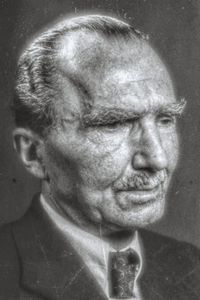Nikos Kazantzakis, a celebrated Greek author of great acclaim, came into the world in Heraklion, the vibrant capital city of Crete, Greece, a land steeped in rich cultural heritage and history. His academic journey was characterized by a unique and ambitious dual pursuit, as he simultaneously pursued the rigorous disciplines of Law and Philosophy in Athens, the cradle of Western civilization, and Paris, the City of Light, renowned for its intellectual and artistic sophistication. Nevertheless, as his intellectual curiosity and passion for knowledge continued to evolve, Kazantzakis' focus gradually shifted, and he devoted himself to the study of Philosophy and Literature, ultimately forging a path that would lead him to become one of the most influential and innovative writers of his time.
Kazantzakis' life was marked by an insatiable thirst for adventure and exploration, as he embarked on a lifelong journey of cultural immersion and linguistic mastery.
His travels took him to diverse corners of the globe, where he was able to absorb the richness and complexity of various cultures, allowing him to develop a profound understanding of the human experience.
As a linguist, Kazantzakis was driven to acquire proficiency in multiple foreign languages, a feat that showcased his exceptional aptitude for language and his boundless enthusiasm for communication.
Moreover, his intellectual curiosity led him to abandon his scientific pursuits to delve deeper into the works of the influential philosopher Friedrich Nietzsche, a decision that would have a profound impact on his writing and worldview.
This decision not only reflected his passion for learning but also his willingness to challenge conventional thinking and push the boundaries of human knowledge.
As a result, Kazantzakis' intellectual and cultural pursuits would come to shape his writing, as he drew upon his vast knowledge of languages and cultures to craft works that were both deeply personal and universally relatable.
Through his writings, Kazantzakis was able to share his experiences and insights with the world, leaving a lasting legacy that continues to inspire and influence readers to this day.
Despite his many accomplishments, Kazantzakis remained humble and grounded, his love of learning and exploration driving him to continually seek out new experiences and knowledge.
In the end, Kazantzakis' life was a testament to the power of curiosity, creativity, and a willingness to take risks, a reminder that even the most seemingly disparate pursuits can come together to form a rich and fulfilling life.
Kazantzakis, a renowned philosopher, has left an indelible mark on the literary world through his esteemed magnum opus, "Ascetics" (Salvatores Dei, 1927),a masterpiece that distills the essence of his profound metaphysical convictions.
This towering intellectual's poetic oeuvre is equally impressive, boasting a diverse array of works that showcase his boundless creativity and artistic prowess. His most celebrated poetic endeavors include the monumental "The Odyssey" (1938),a sweeping epic that has captivated readers for generations, as well as the lesser-known yet no less remarkable "Tertsines".
Furthermore, Kazantzakis has made significant contributions to the world of theatrical poetry, crafting a range of works that have been performed on stage to great acclaim. Some of his most notable theatrical endeavors include "Protomastoras" (Foreman),a gripping drama that explores the human condition; "Melissa" (Bee),a poignant and thought-provoking exploration of the complexities of love and relationships; "Julian", a powerful and emotionally charged drama that delves into the depths of the human psyche; and "Prometheus", a bold and innovative work that pushes the boundaries of traditional poetry.
Through his diverse and accomplished body of work, Kazantzakis has left an indelible mark on the world of literature, cementing his position as one of the most important and influential thinkers of the 20th century.
The literary legacy of Kazantzakis, a renowned author, is characterized by a diverse array of notable novels that have made a significant impact on the literary world. Among his most famous works are "Alexis Zorbas", a novel published in 1946 that has since become a classic of Greek literature, as well as "O Xristos xanastavronetai", a thought-provoking and deeply philosophical novel published in 1948 that explores themes of faith, doubt, and the human condition.
Kazantzakis's literary output continued to flourish in the years that followed, with the publication of "O ftoxoulis tou Theou" in 1952-3, a novel that delves into the complexities of human nature and the search for meaning in a seemingly chaotic world. Finally, in 1961, Kazantzakis published "Anafora ston Greco", a novel that serves as a poignant and introspective reflection on the human experience, exploring the intricate relationships between individuals, society, and the natural world.
Kazantzakis's life came to a sudden and untimely end in the year 1957, marking the conclusion of a remarkable journey that had seen him leave an indelible mark on the literary world. As the curtain closed on his mortal existence, he bequeathed to posterity a rich and diverse body of work, replete with profound insights, philosophical musings, and masterful storytelling that continue to exert a profound influence over readers and writers alike. To this day, the literary landscape remains forever changed by the presence of his remarkable oeuvre, a testament to the enduring power of his ideas and the abiding significance of his creative output.
The fascinating tale of a remarkable individual, whose life has been a testament to perseverance, creativity, and a relentless pursuit of excellence. Born into a world filled with uncertainty, this remarkable person's early years were marked by a sense of curiosity and wonder, as they explored the world around them, soaking up knowledge like a sponge.
As they grew older, their innate talents and passions began to take shape, as they discovered a deep love for the arts, music, and the written word. Their early endeavors were met with a mix of encouragement and skepticism, but undeterred, they continued to hone their craft, pouring their heart and soul into every project.
Throughout their journey, this extraordinary individual has been blessed with a unique blend of creativity, intelligence, and a strong work ethic, allowing them to overcome numerous obstacles and setbacks. Their dedication to their craft has been rewarded with numerous accolades and recognition, as they have left an indelible mark on their chosen field.
Despite their many accomplishments, this remarkable person remains humble and grounded, never losing sight of their roots or the people who have supported them along the way. Their story is a testament to the power of hard work, determination, and a refusal to give up on one's dreams, inspiring countless others to follow in their footsteps.
Nikos Kazantzakis, a renowned Greek writer, was ushered into this world on February 18, 1883, in the historic city of Heraklion, Crete, Greece, amidst a family of humble means. The early years of his life were characterized by an unrelenting passion for knowledge and a thirst for learning, which ultimately propelled him to pursue higher education in the esteemed institutions of Athens and Paris. Initially, Kazantzakis was drawn to the field of Law, yet his insatiable intellectual curiosity soon redirected his focus towards the realms of Philosophy and Literature, setting the stage for a life-long journey of creative expression and intellectual exploration.
Kazantzakis, a man of insatiable wanderlust, spent his life traversing the globe, immersing himself in the rich tapestry of diverse cultures and linguistic traditions. His profound interest in the writings of Friedrich Nietzsche had a profound impact on his philosophical perspective, shaping his worldview and influencing the very fabric of his thought.
Kazantzakis's literary odyssey, spanning multiple decades, was a testament to his unwavering dedication to his craft, yielding an impressive array of creations that traversed the realms of poetry, plays, and novels. Among his most notable literary endeavors was the novel "Alexis Zorbas", penned in 1946, which would later be adapted into a cinematic masterpiece in 1964, captivating audiences worldwide with its timeless themes and memorable characters.
Kazantzakis, a renowned literary figure, experienced a life of turmoil and controversy beyond the realm of his notable literary achievements. His unwavering dedication to the pursuit of Greek independence was matched only by his unrelenting critique of the country's authoritarian regime, a stance that often placed him in direct opposition to the government.
Nikos Kazantzakis, a renowned Greek writer, novelist, and philosopher, breathed his last on October 26, 1957, at the ripe age of seventy-four, leaving in his wake a profound and lasting impact on the literary world, a testament to his unwavering dedication to his craft and his unrelenting passion for exploring the complexities of the human condition, his works continuing to enthrall and inspire readers and writers alike to this very day.




















